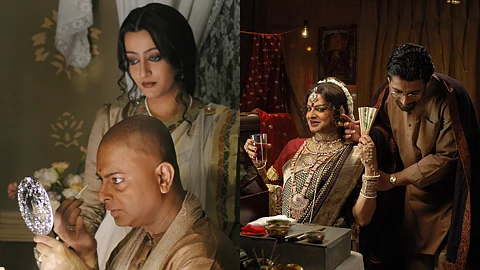
- HOMEGROWN WORLD
- #HGCREATORS
- #HGEXPLORE
- #HGVOICES
- #HGSHOP
- CAREERS
- ABOUT US
- CONTACT US

Rituparno Ghosh (1963–2013) emerged in the Bengali film scene at a time when Bengali cinema was looking for a new pioneer. Satyajit Ray and Ritwik Ghatak had passed, and the outspoken Mrinal Sen was nearing the end of his filmmaking career. Standing at this juncture, Ghosh was one of the first Indian filmmakers to openly reimagine queerness within the emotional, cultural, and aesthetic contours of mainstream Bengali cinema in the 1990s. He re-introduced Bengal to a new cinema of queer intimacy, longing, and interiority — one that seduced the bhadralok middle class even as it challenged their traditional social and political values.
Rituparno Ghosh’s final films — 'Arekti Premer Golpo' (2010), 'Memories in March' (2011), and 'Chitrangada: The Crowning Wish' (2012) — marked a revolution in Bengali cinema. These were the first films to center openly queer protagonists on the Bengali silver screen, arriving at a moment when India’s queer politics were in turbulent transition. Between the 2009 reading down of Section 377 and its subsequent reinstatement in 2013, Ghosh carved out a cinematic space where queer individuals could speak, mourn, and desire without disguise.
Each of these films situates queer longing within Kolkata’s “neo-bhadralok” milieu — upper-middle-class, English-speaking, urban, and culturally cosmopolitan. But Ghosh’s interest lay in unsettling that comfort. These films use the familiar, domestic spaces of the drawing room, the dance studio, and the family kitchen to subvert heteronormative conventions. As Judith Butler might put it, Ghosh crafted a “liberating and transgressive space” that reimagined love, gender, and kinship beyond the regime of compulsory heterosexuality in these final films. At the same time, by invoking Tagore, traditional Bengal jatra folk theatre, and colonial-era laws, Ghosh rooted queer identity in a specifically Indian past, arguing for its place within — not outside — India's cultural traditions.
Gender As Identity, Gender As Performance
Performance — both literal and metaphorical — is the unifying thread of these films. In Arekti Premer Golpo, Abhiroop Sen, a transgender filmmaker played by Ghosh himself, dons drag while shooting a documentary on Chapal Bhaduri, the legendary female impersonator of Bengali jatra folk theatre. In Memories in March, grief unfolds through hushed domestic scenes between a mother and her dead son’s homosexual lover. In Chitrangada, a modern staging of Tagore’s dance-drama becomes a mirror for the protagonist’s own gender transition. In all three films, Ghosh used performance to reveal gender as constructed, unstable, and deeply intimate. Whether through Radha’s makeup, Tagore’s choreography, or a tense conversation over dinner, these films depict identity not as a fixed truth but as something rehearsed and performed — often painfully, and sometimes defiantly.
Class, Capital & Queer Visibility
All three of these films consciously foreground class. While Abhiroop’s silks and saris speak of cosmopolitan privilege, Chapal’s worn clothes betray the cost of survival. Ghosh’s characters often inhabit well-furnished bourgeoisie apartments and air-conditioned offices. While this bourgeois setting may seem exclusionary, it’s also strategic: by normalizing queer lives within aspirational spaces, Ghosh invites middle-class audiences to confront and acknowledge queer desire as domestic reality.
This class lens also exposes a paradox in Ghosh’s films. Queer self-expression, in Ghosh’s world, is often a luxury — one denied to Chapal, whose poverty forces conformity. As scholars have noted, Ghosh’s films often unfold within the aesthetic and material trappings of neoliberal modernity, but use them to challenge the values that underpin it.
A Queer Cinematic Canon Of Belonging
In these final films, Rituparno Ghosh reclaimed the private space as political, the aesthetic gesture as subversive. These films predate contemporary conversations about marriage equality, the 2018 decriminalisation of homosexuality, and the mainstreaming of queer discourse in Indian media. Yet, more than a decade after Ghosh’s untimely death, they still feel enduringly contemporary in their exploration of queer identity and desire.
As postcolonial queer theorists emphasize, identity is not a fixed, ahistorical concept, but rather shaped by historical and social contexts, particularly those of colonialism and its aftermath. By invoking jatra, Tagore, and the colonial legacy of Section 377, Ghosh reminds us that queerness in India is not imported — it is deeply, stubbornly indigenous. In looking through this lens, his queer cinema is less about transgression than about belonging: to families, to lovers, to culture, and to the world at large.
To learn more about Rituparno Ghosh, watch 'Bird of Dusk', a docu-feature about the life and works of Rituparno Ghosh by Sangeeta Datta.
If you enjoyed reading this, here's more from Homegrown:
The Intersectionality Of Queer Cinema: How Fat Phobia Is Present In The Indian Queer Community
5 Underrated Regional Films That Portray The Everyday Reality Of Queerness In India
How Rituparno Ghosh's Filmography Explored Womanhood Through A Feminist Lens
